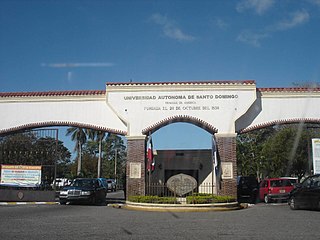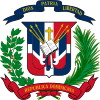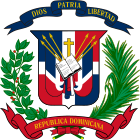
The Dominican Republic is a country located on the island of Hispaniola in the Greater Antilles archipelago of the Caribbean region. It occupies the eastern five-eighths of the island, which it shares with Haiti, making Hispaniola one of only two Caribbean islands, along with Saint Martin, that is shared by two sovereign states. The Dominican Republic is the second-largest nation in the Antilles by area at 48,671 square kilometers (18,792 sq mi), and third-largest by population, with approximately 10.7 million people, down from 10.8 million in 2020, of whom approximately 3.3 million live in the metropolitan area of Santo Domingo, the capital city. The official language of the country is Spanish.

The recorded history of the Dominican Republic began in 1492 when the Genoa-born navigator Christopher Columbus, working for the Crown of Castile, happened upon a large island in the region of the western Atlantic Ocean that later came to be known as the Caribbean. It was inhabited by the Taíno, an Arawakan people, who called the eastern part of the island Quisqueya (Kiskeya), meaning "mother of all lands." Columbus promptly claimed the island for the Spanish Crown, naming it La Isla Española, later Latinized to Hispaniola. The Taínos were nearly wiped out due to European infectious diseases. Other causes were abuse, suicide, the breakup of family, famine, the encomienda system, which resembled a feudal system in Medieval Europe, war with the Castilians, changes in lifestyle, and mixing with other peoples. Laws passed for the Indians' protection were never truly enforced.

The Dominican Republic is a representative democracy, where the President of the Dominican Republic functions as both the head of the government and head of the multi-party system. Executive power is exercised by the government. Legislative power is vested in the bicameral National Congress. The Judiciary is independent of the executive and the legislature.

The Senate of the Dominican Republic is the upper house in the bicameral legislature of the Dominican Republic, and together with the Chamber of Deputies makes up the Congress.

The Dominican Republic is divided into thirty–one provincias, while the national capital, Santo Domingo, is contained within its own Distrito Nacional.

The Supreme Court is the highest court in the Philippines. The Supreme Court was established by the Second Philippine Commission on June 11, 1901 through the enactment of its Act No. 136, an Act which abolished the Real Audiencia de Manila, the predecessor of the Supreme Court.

The Universidad Autónoma de Santo Domingo (UASD) is the public university system in the Dominican Republic with its flagship campus in the Ciudad Universitaria neighborhood of Santo Domingo and with regional campuses in many cities of the Republic. It was founded by Jose Gabriel Garcia and Emiliano Tejera in 1866 as the Professional Institute, replacing the former Universidad Santo Tomás de Aquino, one of the first universities of the Western Hemisphere (Americas), which was founded unofficially by a Papal bull in 1538, officially by royal decree in 1558, and closed in 1822. It was later renamed University of Santo Domingo in 1914.

Lesbian, gay, bisexual, and transgender (LGBT) persons in the Dominican Republic do not enjoy the same rights as non-LGBT residents, and face legal and social challenges that are not experienced by other people. While the Dominican Criminal Code does not expressly prohibit same-sex sexual relations or cross-dressing, it also does not address discrimination or harassment on the account of sexual orientation or gender identity, nor does it recognize same-sex unions in any form, whether it be marriage or partnerships. Households headed by same-sex couples are also not eligible for any of the same rights given to opposite-sex married couples, as same-sex marriage is constitutionally banned in the country.

The Ozama Fortress, also formerly known as the city wall's Homage tower. It is one of the surviving sections of the Walls of Santo domingo, which is recognized by UNESCO as being the oldest military construction of European origin in the Americas. It was built between 1502-1508 by the Spanish at the entrance to Santo Domingo's Ciudad Colonial, Dominican Republic, and overlooking the Ozama River. Named after this river, the castle, also referred to as "La Fortaleza" or "The Fortress". It was declared by UNESCO as a World Heritage Site, together with the other historical monuments of the Ciudad Colonial.
The Vicini family is the wealthiest family in the Dominican Republic and is best known for their vast holdings in the sugar industry. The family business was started by Juan Bautista Vicini Canepa, who migrated to the Dominican Republic from Italy in 1860.

Ramón Arturo Cáceres Vasquez, nicknamed Mon Cáceres, was a Dominican politician and minister of the Armed Forces. He was the 31st president of the Dominican Republic (1906–1911). He served as vice president under Carlos Felipe Morales until assuming office in 1906. Cáceres was the leader of the right-wing Red Party.

The Supreme Court of Justice of El Salvador is the highest court of El Salvador. The court sits in San Salvador. The current president is Judge José Belarmino Jaime, who has held the position for three consecutive terms.

José Núñez de Cáceres y Albor was a Dominican politician and writer. He is known for being the leader of the independence movement against Spain in 1821 and the only president of the short-lived Republic of Spanish Haiti, which existed from December 1, 1821 to February 9, 1822. This period was known as the ephemeral independence because it quickly ended with the Unification of Hispaniola under the Haitian government.
Juliana Deguis Pierre is a Haitian-Dominican woman, who was the plaintiff in the landmark Dominican lawsuit against the civil registry authority of the Dominican Republic which ruled that people born to illegal parents never had any right to the Dominican citizenship by birth. Deguis applied to the Special Naturalization Amnesty and on August 1, 2014 she acquired the Dominican Republic citizenship.
José Ignacio Ramón Paliza Nouel is a politician and lawyer from the Dominican Republic. He is the President and Chairman of the Modern Revolutionary Party since 14 June 2018, and Administrative Minister of the Presidency since 16 August 2020. He was senator representing the province of Puerto Plata for the 2016–2020 period.

José Gabriel García was a Dominican army officer, historian, politician, journalist and publisher. He is regarded as a cultural pioneer as well as the "Father of Dominican History". He was the author of "Compendium of History of Santo Domingo", published in four volumes in 1867, 1887, 1900 and 1906 respectively, and made numerous contributions in the fields of culture, literature and education.

The Supreme Court of the Dominican Republic is the highest court existing in the Republic and is, therefore, the head of the judiciary in the country.

Human rights in the Dominican Republic constitute the civil and political rights and freedoms legally protected under the Constitution of the Dominican Republic and enforced by the government through common and statutory law. The majority of human rights disputes are presided over by the highest court of constitutional appeal, the Dominican Constitutional Tribunal. These rights and freedoms have developed over time in accordance with the Dominican Republic's expansion from the former Spanish colony of the Captaincy General of Santo Domingo to its modern state formation. The history of human rights in the state have also been marked by the oscillation between democratic administrations, such as the current presidency of Danilo Medina, and authoritarian administrations, most significantly the dictatorial regime of Rafael Trujillo between 16 August 1930 and 16 August 1938. As a member of the Organization of American States and the United Nations, the Dominican Republic is party to myriad legal treaties and covenants which propagate the human rights standards of the international community and have integrated the majority of these human rights directives into their domestic legislation.
Dominican Republic nationality law is regulated by the 2015 Constitution, Law 1683 of 1948, the 2014 Naturalization Law #169-14, and relevant treaties to which the Dominican Republic is a signatory. These laws determine who is, or is eligible to be, a citizen of the Dominican Republic. The legal means to acquire nationality and formal membership in a nation differ from the relationship of rights and obligations between a national and the nation, known as citizenship. Nationality in the Dominican Republic is typically obtained either on the principle of jus soli, i.e. by birth in the Dominican Republic; or under the rules of jus sanguinis, i.e. by birth abroad to a parent with Dominican nationality. It can also be granted to a permanent resident who has lived in the country for a given period of time through naturalization or for a foreigner who has provided exceptional service to the nation.
Trina de Moya, also known by Trinidad de Moya, Trina de Moya de Vásquez, and Doña Trina, was a Dominican poet and writer. She served as the First Lady of the Dominican Republic as the wife of President Horacio Vásquez for three nonconsecutive terms. De Moya was the first Dominican presidential wife to be called "first lady", a title which came into widespread public usage during her third tenure from 1924 to 1930.














